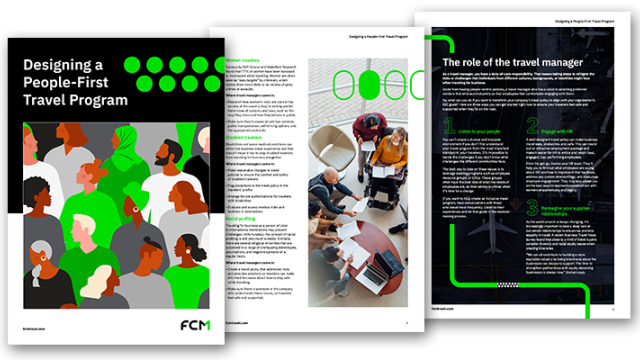Supporting Asian American, Native Hawaiian, & Pacific Islander travelers
Every May, a spotlight is shown on the 25.7 million Americans of Asian, Native Hawaiian, or Pacific Islander (AANHPI) descent. Not only is it a time to celebrate and learn about AANHPI heritage, but it also is an opportunity to bring light to unique challenges the folks of the AAPI community face – and how those of other communities can recognize, respect, and give support. The words of President Joe Biden marking AAPI Heritage Month this year left a sobering reminder:
Despite the immeasurable ways AA and NHPIs enrich this country, we continue to see persistent racism, harassment, and hate crimes against these communities.
- President Joe Biden
During AANHPI Heritage Month and throughout every other month of the year, we urge companies to take the time to consider how their travel program can support their AANHPI corporate travelers. To help you take a closer look, we’ve gathered some points to review in your duty of care and diversity, equity, and inclusion (DEI) travel framework.
US government response to AANHPI hate crimes & inequity
The Biden Administration has signed and rolled out various memorandums, laws, and executive orders in the wake of an increase in inequity and crime toward AANHPI people in the US. The increase in government attention toward this specific group indicates a need for all organizations, and travel programs, to shift their focus.
January 26, 2021: the President issued a Memorandum Condemning and Combating Racism,
Xenophobia, and Intolerance Against Asian Americans and Pacific Islanders in the United States.
May 20, 2021: the President signed the bipartisan COVID-19 Hate Crimes Act.
May 28, 2021: the President signed Executive Order 14031, Advancing Equity, Justice, and
Opportunity for Asian Americans, Native Hawaiians, and Pacific Islanders.
June 25, 2021: the President issued Executive Order 14035, Diversity, Equity, Inclusion, and
Accessibility (DEIA) in the Federal Workforce.
October 11, 2021: the President issued Executive Order 14049 to establish the White House
Initiative on Advancing Educational Equity, Excellence, and Economic Opportunity for Native Americans and Strengthening Tribal Colleges and Universities.
February 18, 2022: the President issued a proclamation marking the 80th anniversary of the Day
of Remembrance of Japanese Incarceration During World War II.
Source: National Strategy and DHS Plan for Asian American, Native Hawaiian, and Pacific Islander Communities

Adjust your travel program to the social climate
The dates of these legislative initiatives indicate that the COVID-19 pandemic, unfortunately, elevated anti-Asian sentiments, resulting in nearly 11,500 hate incidents since tracking began in March 2020. This is far from the first time in American history that the AANHPI community has been discriminated against. Still, companies can learn from the past to better support their now that corporate travel is moving at an unprecedented speed.
Extra considerations should be taken for people of AANHPI descent, but don’t forget about intersectionality. While this is not an extensive list, people (including AANHPI in these groups) at higher risk could include:
- Travelers within specific racial groups
- Travelers within specific ethnic groups
- Female travelers
- Pregnant travelers
- Travelers with varying mobility needs
- Travelers with sight or hearing impairment
- Travelers with chronic illness
- Travelers with an invisible disability
- Travelers who are in the LGBTQ+ community
- Travelers who are transgender and/or non-binary
- Travelers who observe salat or other faith practices
- Multilingual travelers or travelers whose first language is not English
Build new foundations with inclusive thinking
Now that you’re considering your AANHPI travelers and their intersectionality, it’s time to start evaluating changes that could be made to support them better. Here’s where to start:
- Consult your HR team, IT team, and DEI manager.
- Run an anonymous survey of your team – led by your DEI manager. Get intel and common concerns from the actual folks affected and give them an opportunity to – again, anonymously – address any elephants in the room. Let them take the lead on any information gaps and necessary improvements. Investigate what’s working and what’s not. Most importantly – listen.
- Once you have a clear understanding, start redesigning your travel program and policy to fit your AANHPI travelers’ needs.
- When working with us, your FCM team can help you capture information for your program, traveler preferences, traveler requirements, business requirements, budgeting information, and how much flexibility you’ll provide. A transparent, inclusive travel policy means that your team has clarity, flexibility, and information when and how they need it.
- FCM provides valuable insight into which destinations carry travel risk as well as on-the-ground tracking for travelers who opt-in and real-time communication.
Check in and be flexible
Diversifying your travel program is not a one-time thing. As seen in recent years, different times can present different challenges. Check in with your business travelers regularly and offer a safe space for feedback. Be sure you also keep changing laws, customs, or political situations in mind and assess whether this requires a policy change or a training session for employees.
Checking in with your internal risk management team and your FCM team can also help provide feedback on the destinations your people are visiting as well.
Although things are ever-changing, it’s worth helping your travelers feel secure and comfortable. Working with FCM can help you design a program to fit both your and their needs.


